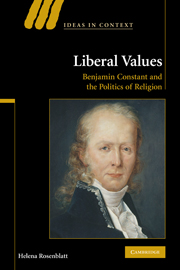Book contents
- Frontmatter
- Contents
- Acknowledgements
- Note on translations
- List of abbreviations
- Introduction
- Chapter 1 Constant's education: the French, Scottish, and German Enlightenments
- Chapter 2 The crucible of the Directory years
- Chapter 3 Napoleon, or battling “the new Cyrus”
- Chapter 4 Constant becomes Constant: from the Principles of Politics (1806) to The Spirit of Conquest and Usurpation (1814)
- Chapter 5 Politics and religion during the Restoration (1814–1824)
- Chapter 6 “The Protestant Bossuet”: De la religion in political context (1824–1830)
- Chapter 7 Constant's legacy
- Select bibliography
- Index
- Ideas in Context
Chapter 3 - Napoleon, or battling “the new Cyrus”
Published online by Cambridge University Press: 22 September 2009
- Frontmatter
- Contents
- Acknowledgements
- Note on translations
- List of abbreviations
- Introduction
- Chapter 1 Constant's education: the French, Scottish, and German Enlightenments
- Chapter 2 The crucible of the Directory years
- Chapter 3 Napoleon, or battling “the new Cyrus”
- Chapter 4 Constant becomes Constant: from the Principles of Politics (1806) to The Spirit of Conquest and Usurpation (1814)
- Chapter 5 Politics and religion during the Restoration (1814–1824)
- Chapter 6 “The Protestant Bossuet”: De la religion in political context (1824–1830)
- Chapter 7 Constant's legacy
- Select bibliography
- Index
- Ideas in Context
Summary
NAPOLEON AND THE CATHOLIC REVIVAL
In her last book, Considérations sur la Révolution française, published posthumously in 1818, Madame de Staël reflected on the religious mood of France at the time of Napoleon's ascension to power. Observant Catholics, she reasoned, had only modest demands in 1799. Principally, they yearned for a reversal of the Revolution's legal impediments to worship. They wanted their priests no longer to be persecuted and forced to swear oaths. They wanted the government to stop “interfer[ing] … with the religious opinions of anyone.” The Consulate would have satisfied public opinion, Madame de Staël thought, if it had simply adopted the same degree of toleration that existed in America.
It was a tragedy for France that this is not what happened. A rare opportunity had been missed to put the country on the road to intellectual and moral progress. Madame de Staël placed the blame squarely on the shoulders of the First Consul, Napoleon Bonaparte, who had other, more personal, ambitions. Privately indifferent to religion, Bonaparte believed only “in his own fortune” and practiced “the cult of himself.” More importantly, he had a “natural penchant for despotism” and wished “to prepare the way for his arrival on the throne.” Bonaparte wanted a clergy the way one might want “servants … titles … decorations.” To this end, he reasoned that a restored Catholic Church would be particularly useful.
Modern scholarship has by and large confirmed Madame de Staël's assessment.
- Type
- Chapter
- Information
- Liberal ValuesBenjamin Constant and the Politics of Religion, pp. 76 - 121Publisher: Cambridge University PressPrint publication year: 2008

